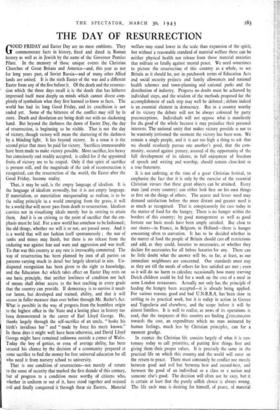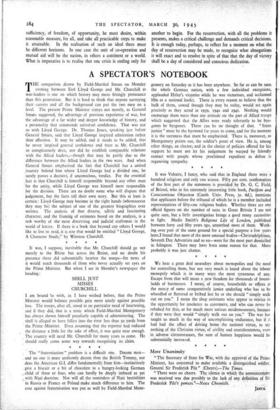THE DAY OF RESURRECTION
GOOD FRIDAY and Easter Day are no mere emblems. They commemorate facts in history, fixed and dated in Roman history as well as in Jewish by the name of the Governor Pontius Pilate. In the memory of those unique events the Christian Churches of Great Britain and America—and, this year as not for long years past, of Soviet Russia—and of many other Allied lands are united. It is the sixth Easter of the war and a different Easter from any of the five before it. Of the death and the resurrec- tion which the three days recall it is the death that has hitherto impressed itself most deeply on minds which cannot divest corp- pletely of symbolism what they first learned to know as facts. The world has had its long Good Friday, and its crucifixion is not ended yet. Some of the bitterest of the conflict may still bp in store. Death and desolation are being dealt out with no slackening hand. But beyond the darkness the claim of Easter Day, the day of resurrection, is beginning to be visible. That is not the day of victory, though victory will mean the shattering of the darkness by a blinding light. It lies beyond victory. In a sense it is the second price that must be paid for victory. Sacrifices immeasurable have been made to make victory possible. More sacrifice, less heavy but consciously and readily accepted, is called for if the appointed fruits of victory are to be reaped. Only if that spirit of sacrifice is present still, and the magnitude of the task of reconstruction is recognised, can the resurrection of the world, the Easter after the Good Friday, become reality.
That, it may be said, is the empty language of idealism. It is the language of idealism avowedly, but it is not empty language. If materialism, or materialism masquerading as realism, is to he the ruling principle in a world emerging from the grave, it will be a world that will never pass from death to resurrection. Idealism consists not in visualising ideals merely but in striving to attain them. And it is on striving to the point of sacrifice that the em- phasis must be laid. For a new world has somehow to be fashioned ; the old things, whether we will it or not, are passed away. And it is a world that will not fashion itself spontaneously ; the war of tanks and mines may finish, but there is no release from the enduring war against fear and want and aggression and war itself.- To that war this country at any rate is irrevocably committed. The way of resurrection has been planned by men of all parties on patterns varying much in detail but largely identical in aim. Un- disputed recognition has been given to the right to knowledge, and the Education Act which takes effect on Easter Day rests on one basic_principle, that neither lowliness of condition nor lack of means shall debar access to the best teaching in every grade that the country can provide. If democracy is to survive it needs not latent, but developed and trained, ability, and that it will secure in fuller measure than ever before through Mr. Butler's Act. What is possible in the way of progress from the humblest origin to the highest office in the State and a lasting place in history has been demonstrated in the career of Earl Lloyd George. He, thanks largely through the self-sacrifice of an uncle, "broke his birth's invidious bar" and "made by force his merit known." In those days it might well have been otherwise, and David Lloyd George might have remained unknown outside a corner of Wales. Today the boy of genius, or even of average ability, has been secured his chance by the decision of a community prepared at some sacrifice to find the money for free universal education for all who need it from nursery school to university.
That is one condition of resurrection—not merely of return to the sense of security that marked the first decade of this century, but of progress to a condition more worthy of citizens who, whether in uniform or out of it, have stood together and resisted evil and finally conquered it through these six Easters. Material welfare may stand lower in the scale than expansion of the spirit, but without a reasonable standard of material welfare there can be neither physical health nor release from those material anxieties that militate so fatally against mental peace. We need sometimes to picture the resurrection of this country as a whole, to see Britain as it should be, not in patchwork terms of Education Acts and social security projects and family allowances and national health schemes and town-planning and national parks and the distribution of industry. Progress no doubt must be achieved by individual steps, and the wisdom of the methods proposed for the accomplishment of each step may well be debated ; debate indeed is an essential element in democracy. But in a country worthy of its victory the debate will not be always coloured by party preconceptions. Individuals will not oppose what is manifestly for the good of the whole because it may prejudice their personal interests. The national unity that makes victory possible is not to be wantonly jettisoned the moment the victory has been won. We remain a single people, and it is not too high a thing to ask that we should resolutely pursue one another's good, that the com- munity, secured against penury, assured of the opportunity of the full development of its talents, in full enjoyment of freedom of speech and writing and worship, should remain close-knit in a true fraternity.
It is not unfitting, at the time of a great Christian festival, to emphasise the fact that it is only by the exercise of the essential Christian virtues that these great objects can be attained. Every man (and every country) can either look first on his own things or first on the things of others. The nearer and lesser need may demand satisfaction before the more distant and greater need is as much as recognised. That is conspicuously the case today in the matter of food for the hungry. There is no hunger within the borders of this country; by good management as well as good fortune our basic needs have been amply satisfied. But close to our shores—in France, in Belgium, in Holland—there is hunger amounting often to starvation. It has to be decided whether in the matter of food the people of Britain should cast off restrictions and add, as they could, luxuries to necessaries, or whether they declare for necessaries for all before luxuries for any. There can be little doubt what the answer will be, so far, at least, as our immediate neighbours are concerned. Our standards must stay as they are till the needs of others far less satisfied are met ; even so it will do no harm to calculate occasionally how many starving Dutch children could be fed for a week on the cost of a meal in some London restaurants. Actually not only has the principle of feeding the hungry been accepted—it is already being applied. For various reasons good and bad U.N.R.R.A. has been slow in settling to its practical work, but it is today in action in Greece and Yugoslavia and elsewhere, and the scope before it will be almost limitless. It is well to realise, as news of its operations is read, that the taxpayers of this country are finding loo,000,000 towards the cost, an expenditure which no man animated by human feelings, much less by Christian principles, can for a moment grudge.
In essence the Christian life consists largely of what it is cus- tomary today to call priorities, of putting first things first and giving them their proper values. It is precisely the same in the practical life on which this country and the world will enter on the return to peace. There must constantly be conflict not merely between good and evil but between best and second-best, and between the good of an individual or a class or a nation and someone else's good. The decision will often not be easy, but it is certain at least that the purely selfish choice is always wrong. The life each • man is desiring for himself, of peace, of material sufficiency, of freedom, of opportunity, he must desire, within reasonable measure, for all, and take all practicable steps to make it attainable. In the realisation of such an ideal there must be different horizons. In one case the unit of co-operation and mutual aid will be the nation, in others a continent or a world. What is imperative is to realise that one crisis is ending only for another to begin. For the resurrection, with all the problems it presents, makes a critical chillenge and demands critical decisions. It is-enough today, perhaps, to reflect for a moment on what the day of resurrection may be made, to recognise what abnegations it will exact and to resolve in spite of that that the day of victory shall be a day of considered and conscious dedication.























 Previous page
Previous page